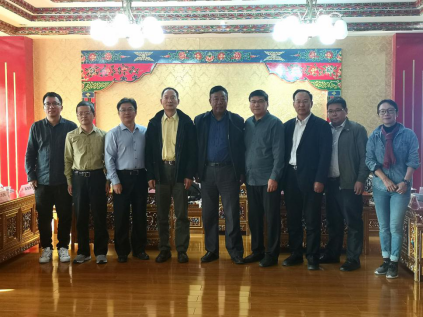Li Xinfeng, Executive Vice President of the CAI led a research team to visit the Tibet Academy of Social Sciences
On September 12, Li Xinfeng, the Executive President of the CAI and director of the IWAAS, led a research team to the Tibet to conduct special investigations on the poverty alleviation work in the Tibet Autonomous Region, especially Medog County.There were 9 scholars in total including the "Ethnic Issues and African Development Research" innovation project team of the IWAAS and the "African Infectious Disease Prevention" project team, including Zhang Yongpeng, the chief researcher of the innovative project team, Li Wengang, the director of the ethnic and religious research office, and Wu Chuanhua,the executive deputy editor-in-Chief of "Journal of China-Africa Studies”.
On September 14, Li Xinfeng and his entourage visited the Tibet Academy of Social Sciences with experts and scholars including Suo Lin, the director of the Tibet Academy of Social Sciences; Xu Wenhua, member of the Tibet Academy of Social Sciences, CPC Committee and deputy director of the Tibet Academy of Social Sciences; Xu Wuda, deputy director of the Institute of Rural Economy; and Kuang Yongmei, deputy editor of the Institute of South Asia and other experts and scholars had a discussion.

Li Xinfeng introduced the relevant situation of the IWAAS and the positioning of the "Four Functions" of the CAI, its research base, exchange platform, talent pool, and communication window, as well as the main purpose of this special survey. Li Xinfeng said that this year is the year for China to finish building a moderately prosperous society in all respects and the final year for poverty alleviation. It is the bounden duty of the CAI to promote the historic achievements of Tibet in poverty alleviation to the world, especially to Africa and as well as it’s an important manifestation of CAI communication window function. The purpose of this survey is to fully understand the achievements and experience of the Tibet in poverty alleviation, so as to better tell the story of poverty alleviation in China and poverty alleviation to Africa and African people, and provide a basis for promoting China-Africa friendly cooperation, especially poverty alleviation cooperation.
Suo Lin warmly welcomed the delegation of the CAI, briefly introduced the basic situation and key research fields of the Tibet Academy of Social Sciences, and focused on the situation of Tibet victory in poverty alleviation.
He said that Tibet, as the country’s only provincial-level contiguous destitute area, is under the leadership of the CPC Central Committee, the strong support of relevant national policies, and the help of brother provinces and regions across the country, with the joint efforts of the people in the district, all the poor counties in the district have already removed from poverty lists, basically solving the overall poverty problem in the region, achieving vigorous economic and social development, and improving people’s lives.
Xu Wuda introduced in detail the historical achievements and experience of the Tibet in poverty alleviation. Up to now, the Tibet has lifted a total of 628,000 poor people out of poverty, and all 74 poor counties (districts) were lifted out of poverty list, with a poverty incidence rate of zero, making it one of the first areas to lift out of poverty in the "three regions and three prefectures".
He said that the Tibet Autonomous Region’s experience in poverty alleviation is particularly important in terms of the following: First, it is necessary to strengthen organizational leadership and implement the main responsibilities for poverty alleviation; second, it is necessary to integrate financial investment resources and innovate the capital input system; third ,it is to strengthen the top-level design and improve the policy guarantee system; fourth ,it is to strengthen the supervision and evaluation system to complete the poverty alleviation goals and tasks.
The historical achievements of the Tibet Autonomous Region in poverty alleviation fully reflect the superiority of China's socialist system and CPC’s development concept of "people-centered".

Finally, the two sides conducted in-depth exchanges on some specific issues of poverty alleviation in Tibet and the significance of reference for poverty alleviation and development in Africa. The two sides expressed that they will continue to strengthen exchanges and cooperation in the future, through the publication of think tank reports and other forms, to earnestly summarize Tibet’s experience and practices in poverty alleviation, announce China’s great achievements in poverty reduction to the world, especially Africa, and further promote China-Africa poverty alleviation and development cooperation.
Address : 1 North National Stadium Road, Chaoyang District, Beijing Post Code : 100007 Tel. : +86 10 87421055 Fax : +86 10 87421046 E-mail : P.O. Box 1120, Beijing
 China-Africa Institute
China-Africa Institute
 Journal of China- Africa Studies
Journal of China- Africa Studies
 West Asia and Africa
West Asia and Africa
